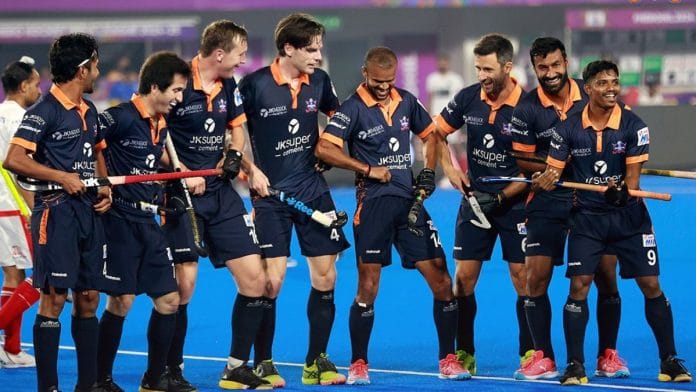New Delhi: The UP Rudras became the third team to withdraw from the 2026 season of the Hockey India League, barely two days before the scheduled mini-player auction on 24 September, citing financial sustainability concerns. The withdrawals underline an old problem that even plagued the earlier edition of the league that had to be suspended in 2017 due to financial losses.
The Hockey India League (HIL), the country’s premier hockey competition for both men and women, was originally launched in 2013. The league resumed in 2024–25 after a seven-year break. Following initial popularity, it struggled to generate sufficient revenue and eventually faced financial losses, leading to its suspension in 2017.
After facing financial crises and a seven-year break, the Indian Hockey League introduced the women’s edition. The initiative was also seen as a step toward increasing investment opportunities by promoting gender inclusiveness. Last year, Dilip Tirkey, former India captain and president of Hockey India, told Mint that “the IPL has given us a good model and this will also have the format of a central pool”. He added that a part of the proceeds from the central pool will be given to the franchises to make sure that the league remains sustainable.
Turkey also stated that they have decided to limit the league to just two venues — Rourkela and Ranchi. “If we have to sustain the league in the long run, we need to reduce the expenses of the franchises.”
The current edition of the Hockey India League initially featured eight men’s teams and four women’s teams, before the withdrawals — with franchises representing various Indian states and cities.
The men’s league has UP Rudras, Team Gonasika, Tamil Nadu Dragons, Shrachi Rarh Bengal Tigers, Vedanta Kalinga Lancers, Hyderabad Toofans, SG Pipers, and JSW Soorma Hockey Club. The women’s teams include Odisha Warriors, Shrachi Rarh Bengal Tigers, SG Pipers, and JSW Soorma Hockey Club. The franchises are owned by corporate groups such as JSW Sports, Vedanta, Shrachi Group, SG Sports, among others.
The UP team is owned by Yadu Sports and includes several top Indian and international players, such as India vice-captain Hardik Singh, recently retired forward Lalit Upadhyay, England’s Sam Ward, Belgium’s Tanguy Cosyns, and Lars Balk of the Netherlands. The team was coached by Paul van Ass, former coach of both the Indian and Dutch national hockey teams.
Before UP Rudra, men’s team Team Gonasika and women’s team Odisha Warriors had pulled out of the league last month citing “personal reasons.” The Odisha Warriors had won the first edition of the revamped HIL last season by defeating Soorma Hockey Club 2–1 in January 2025. The next season is expected to start in January 2026.
“This was not an easy call. We value what the league has brought to Indian hockey, but sustainability challenges made continuation untenable,” said Cedric D’Souza, UP Rudras’ team director, in a statement on Monday.
Following UP Rudras’ withdrawal, the men’s league is left with six teams — unless a replacement team or a new owner for the UP franchise is found. Bhola Nath Singh, Secretary General of Hockey India, confirmed that they received the team’s decision via email on Sunday.
“We will manage the situation, and the league will go on,” Singh was quoted by The Indian Express.
The many issues
The Hockey India League was discontinued after five seasons in 2017 due to financial constraints and a lack of cooperation from team owners. Even before the league was put on a seven-year break, several franchises had complained about significant financial losses, including unpaid dues to players and coaching staff.
The operational costs of the tournament — covering travel, accommodations, and venues — were so high that the revenue from sponsors, ticket sales, and broadcasting could not cover it.
After the revival of the HIL in 2024–25, many players, especially from the women’s teams, complained about not receiving full payments even months after the tournament ended.
Some players reported having received only 20 per cent of what they were owed even a month after the women’s HIL concluded in January.
Several franchise owners, such as Mumbai Magicians and Ranchi Rhinos, had also pulled out from the league in its earlier version due to financial problems and low revenue generation.
One of the major issues cited in the 2024–25 edition was that many matches were held at venues far from the franchises’ home bases, such as in Rourkela, Odisha, which meant franchises couldn’t leverage home ticket sales, local fan engagement, or local sponsorships.
Broadcast revenue has always been lower than expected in the Hockey India League.
“Representing the Rudras in the Hockey India League has been an honour. Our fans have stood by us with unwavering loyalty. While this chapter closes, our dedication to hockey and to inspiring future athletes continues at the grassroots level,” said Indian Hockey team vice-captain and UP Rudras’ star player Hardik Singh.
(Edited by Aamaan Alam Khan)






